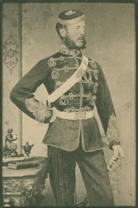Quintessential cavalryman and Victorian Police Inspector Octavius Skinner Burton was born in Wales in 1823, the eighth (hence Octavius) of ten children. Burton was a descendent of well connected and established families with Irish antecedents; his father had served as a Captain in the Royal Staffordshire Militia. Little is known of Octavius Burton’s formative years.
When he was 25 he was accepted into the Austrian Army as a cadet. It was here that he received his first training as a cavalryman, and on the hardest training field of all – the battlefield. During 1848-49, when he was promoted to Sub-Lieutenant, he served in the infantry and then with two famous regiments, the Walmoden Curassiers and the Radetsky Hussars. Burton ‘saw much active service…during the Austro-Hungarian war. Was present at the bombardment of Vienna… was present in 23 pitched battles including celebrated charges of Babolna and Moor…’
Burton was in the thick of the major campaign against Hungary which culminated in its surrender in August 1849, but by 1850 he had returned home. At about this time, the new Victorian Government, faced with a burgeoning population and the desertion of many of its policemen, both courtesy of the discovery of gold in the colony, advertised for policemen in England.
The young veteran Burton responded to the call and emigrated for Melbourne, arriving on the Sir Henry Hardinge in mid-1853. He was immediately appointed as a Police ‘Lieutenant’ at a salary of £300 a year. Assigned to the goldfields around Bendigo between 1854-55, in late 1856 Burton is found in charge of mounted drill at the Victoria Police depot at Richmond, where he was known as ‘Dandy’ Burton.
The Victorian Yeomanry Corps had been formed in October 1855 with 73 Volunteers. In July 1857, Burton transferred to the Volunteer Force as a paid staff officer and his appointment as Captain and Adjutant of the corps soon followed. By May 1858, on the occasion of the Queen’s Birthday review on the field near Prince’s Bridge when 50 Volunteers paraded along with the redcoats of the 40th (2nd Somersetshire) Regiment of Foot, Burton’s work was already in evidence:
‘Of the Volunteer Companies we have great pleasure in saying that a very marked improvement was observable since they were prominently before tho public last year, both in their general appearance and their training. The Yeomanry Corps were…exceedingly well mounted, and as a rule the horses showed a great amount of careful training.’
As the full-time Adjutant and Captain in his cavalry unit, Burton’s salary was now substantial at £450 p.a. This stability allowed him to marry in 1858, to Esther Hull, daughter of William Hull. A retired wine merchant who later became a MLC in the Victorian Parliament from 1860-1866, William Hull also claimed a long association with the 40th (Somerset) Regiment.
Burton became a central figure in the Volunteer cavalry forces for the next decade. The Volunteer forces continued to evolve with each new political iteration and almost every new war scare (of which there were many in Victoria in the second half of the 19th century). In January 1861, following a re-organisation, Burton was appointed Captain and Adjutant of the 1st, or Royal, Victorian Volunteer Cavalry, or, as it became better known, the Prince of Wales Light Horse, commanded by Major Caleb Anderson. In 1862, Burton became the Adjutant of the Victorian Volunteer Cavalry and his official station became Geelong. In this capacity he travelled to places such as Schnapper Point, Dandenong, Kyneton, Heidelberg, Ballarat and Castlemaine – and of course Melbourne – to drill and enrol cavalrymen.
He commanded escorts for official parties and occasions, attended the inevitable levees and balls, oversaw manoeuvres at the Easter camps and reviews of Volunteers, acted as range superintendant at matches of the Victorian Rifle Association, and served on the Committee of the Volunteer Sword and Fencing Club. In May 1865, Burton was appointed as Cavalry Staff Officer of the Local Force of Volunteers. His salary remained the same although by 1877 his family grew to eight children.

During the 1860s, the war in New Zealand also waxed and waned and hundreds, perhaps thousands of volunteers, many of them from the local Volunteer forces, went from Victoria to fight or as military settlers in New Zealand. In early 1866 Burton spent a month in New Zealand, on full pay and on official leave, no doubt much to his personal satisfaction.
Burton returned to Victoria in April 1866, where he continued his usual duties. These included converting the field artillery to horsed artillery, supervising examinat
ions for non-commissioned officers in Clunes, and umpiring a Naval Brigade cutlass drill competition at Sandridge. In November 1867, he was appointed the primary escort officer for the visit of the Duke of Edinburgh to Victoria.
With the departure of the Royal visitor, another reorganisation of the Volunteer forces found the staff officer positions eliminated. Burton’s role as cavalry staff officer was one of those, but on 1st July 1868 he was able to be re-appointed to the Victorian Police Force with his old rank of Sub-Inspector. He remained in the Police Force until being superannuated in 1880 after the final three years of service in Geelong as an Inspector.
Burton died in St. Kilda on 24 February 1895, aged 71. He was one of the early characters of the Victorian Police Force and the Volunteer forces. No doubt his experiences in the Austro-Hungarian War had developed in him a powerful sense of discipline and a certain toughness, qualities which he brought to both police work and to cavalry staff work in Victoria. The Argus said of him that: ‘Captain Burton, although a strict disciplinarian, was of a genial, kindly temperament, and was much liked by those who had business or social relations with him.’
Contact Andrew Kilsby about this article.






